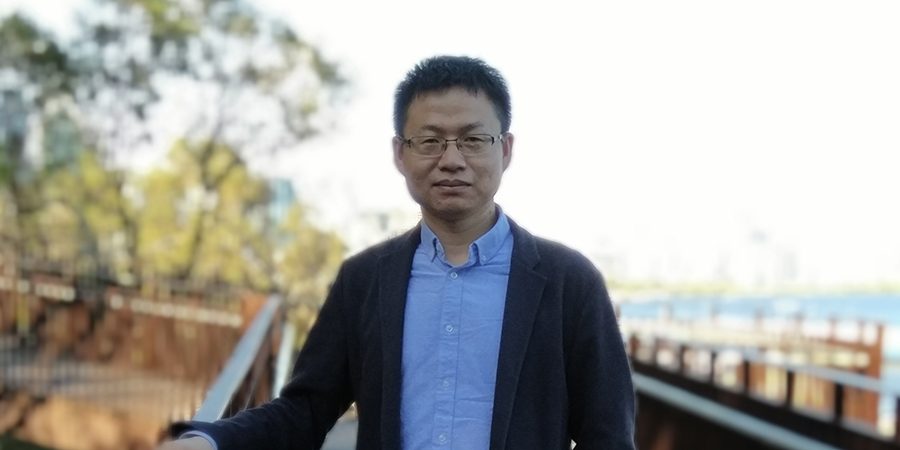
Meet Xiongfei Pan, Visiting Fellow, Food Policy
Xiongfei Pan is a Visiting Fellow at The George Institute for Global Health (TGI). He received medical training in Sichuan University, a MSc in Public Health from London School of Hygiene and Tropical Medicine, a MSc/PhD in Epidemiology and Biostatistics from Sichuan University, and postdoc training in Huazhong University of Science and Technology.
His work at the George Institute is supported by the Endeavour Research Fellowship from the Australian Department of Education and Training, and the International Postdoctoral Exchange Fellowship from the China Postdoctoral Council, and a training fellowship in nutrition epidemiology and food policy from the The George Institute.
What is the focus of your work at The George Institute?
I closely work with A/Prof Jason Wu and Prof Bruce Neal in the Food Policy Division in two streams of research. The first stream is explorations of modifiable lifestyle risk factors for cardiometabolic disease, with nutrition epidemiology as the focus, while the other is multidisciplinary investigations for perinatal determinants for maternal and child health outcomes.
For the first stream, I am examining the long-term impact of healthier and less healthy diets, as defined by the Australian Health Star Rating dietary index, on major noncommunicable diseases. In addition, I am assessing associations of very long-chain monounsaturated fatty acids with incident congestive heart failure using large cohorts from all overall the world. For the second stream, I am analyzing current patterns of total and specific dairy food intakes and their biomarkers in relation to incident gestational diabetes among Chinese pregnant women. This project is funded by The George Institute LMIC seed grant led by A/Prof Wu, and uses research sources from the Shuangliu Birth Cohort Study co-led by Prof An Pan from Huazhong University of Science and Technology and me. I also collaborate with multiple researchers in a wide range of projects exploring metabolomics, environmental pollutants, and gut microbiota for gestational diabetes. Using a life-course approach to research, I aim to contribute to the evidence for early determinants of noncommunicable diseases.
Can you tell us more about the birth cohort program you are working on?
The Shuangliu Birth Cohort Study is a large ongoing birth cohort in Western China. It enrolls ~10,000 pregnant women and their partners during early pregnancy in Shuangliu of Chengdu, where 0.8 million people reside, and follows up the participants and their offspring until three years old in the first instance. It collects comprehensive maternal, paternal, and child exposure and health data through mobile device-based questionnaires during the whole pregnancy and after childbirth, and multiple types of biospecimens including venous blood, urine, stool, placenta tissues, and cord blood. It also links to local pre-pregnancy and pre-marital check-up registries, hospital information systems, and the local maternal and child health management system to enrich data spanning from the premarital phase to the early childhood phase of the offspring. The Shuangliu Birth Cohort Study is becoming a leading multidisciplinary research platform for prevention, prediction, and treatment of major maternal and child diseases such as gestational diabetes and childhood obesity in Western China. It can also be a major resource for women and child health research at TGI, and for other collaborative work between researchers at TGI and Huazhong University of Science and Technology in future. Of note, two TGI LMIC seed grant projects led by A/Prof Jason Wu and Dr Jane Hirst are conducted through the Shuangliu Birth Cohort Study.
What inspires you in the work you do and why?
With demographic and epidemiological transitions, noncommunicable diseases are becoming dominant causes of mortality and morbidity in China and other rapidly major developing countries. Most noncommunicable diseases such as coronary heart disease and diabetes are complex diseases that involve multiple causes at multiple phases of life. I would like to push the boundaries of health research, and contribute to the discovery of determinants of these diseases in the early phase of life. The simple thrills from working with excellent mentors and colleagues around me keep me moving on the track.
What are the main areas of research needs to improve maternal and child health in China?
China has achieved tremendous progress in under-five mortality and maternal mortality in the past three decades. There is a gradual shift of burden from mortalities to morbidities for both mothers and their offspring. In such context, it is essential to explore causes of and interventions for these major morbidities, and their long-term health impacts for both mothers and their offspring. For example, gestational diabetes and fetal macrosomia are prevalent in Chinese and their prevalence can reach up to 10% in certain regions, and one of the causes could be unhealthy diets and overnutrition. Due to a lack of well-designed and conducted nutrition epidemiological studies, effective prevention and intervention strategies are still to be implemented.
What do you like most about working at The George Institute?
The George Institute is a fabulous institution dedicated to the discovery, development, and delivery of effective health services and products in the pursuit of health for all. I like the nurturing academic environment that allows for both academic freedom and rigor, and enjoy working on cutting-edge projects with meticulous supervision and unstinting support from excellent colleagues.

